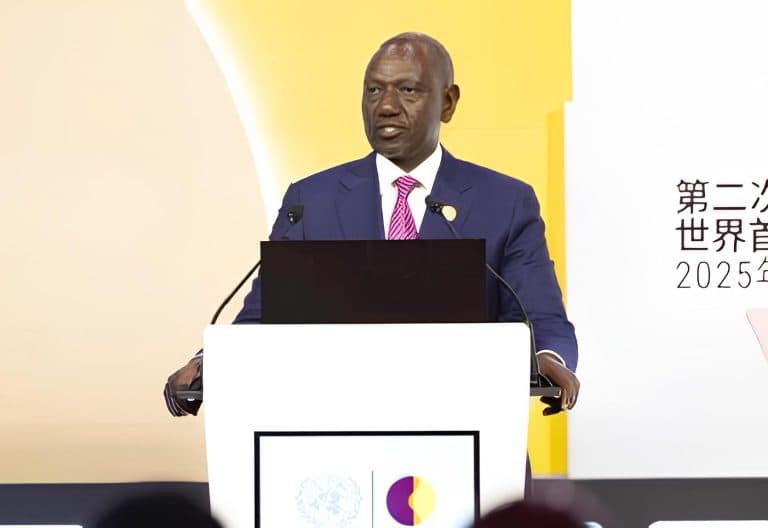We're loading the full news article for you. This includes the article content, images, author information, and related articles.
President Ruto’s congratulatory message to Samia Suluhu Hassan is carefully balanced with calls for rule of law, as post-election violence and reports of irregularities test Kenya's diplomatic position and threaten regional stability.

NAIROBI – Kenyan President William Ruto has publicly congratulated Tanzanian President Samia Suluhu Hassan on her disputed re-election, while simultaneously calling for peace and adherence to the rule of law, following an election marred by widespread violence, accusations of fraud, and condemnation from international observers. The statement, released on Monday, November 3, 2025, places Kenya in a delicate diplomatic position, balancing its strategic interests with a key East African Community (EAC) partner against growing concerns over the state of democracy in the neighbouring country.
Tanzania's National Electoral Commission declared President Suluhu the winner of the October 29, 2025, poll with an overwhelming 97.66% of the vote. This result followed a campaign period where major opposition parties were effectively sidelined; Chadema, the main opposition party, was disqualified, and its leader, Tundu Lissu, was arrested on treason charges. The Alliance for Change and Transparency (ACT-Wazalendo) also had its presidential candidate disqualified.
The election's credibility has been severely questioned by several major observer missions. In a damning preliminary report, the African Union (AU) Election Observation Mission stated the election “did not comply with AU principles, normative frameworks, and other international obligations and standards for democratic elections.” The AU mission, led by former Botswana President Mokgweetsi Masisi, cited an environment not conducive to peaceful conduct, ballot stuffing, and the expulsion of observers during vote counting. Similarly, the Southern African Development Community (SADC) mission reported that the process “fell short of the requirements of the SADC Principles and Guidelines Governing Democratic Elections,” noting an intimidating atmosphere and obstruction of their observers by security forces. The European Union also voiced serious concerns over the violence and lack of a level playing field.
In contrast, the EAC's observer mission, led by former Ugandan Vice-President Dr. Speciosa Kazibwe, issued a more muted preliminary statement, commending the generally calm campaigns and urging stakeholders to maintain peace and use legal channels to resolve disputes. This cautious tone has drawn criticism for understating the severity of the issues documented by other international bodies.
President Ruto’s message on Monday, November 3, 2025, emphasized the “deep historical ties and common aspirations” between Kenya and Tanzania, both key members of the EAC. “I call upon the patriotic people of Tanzania to uphold peace and the rule of law, and I encourage all political actors and stakeholders to embrace dialogue and tolerance as they seek to resolve any issues at hand,” Ruto stated.
The post-election crackdown in Tanzania has direct implications for Kenya. On Friday, November 7, 2025, Kenya's Foreign Affairs Minister, Musalia Mudavadi, confirmed that the government had formally engaged Tanzanian authorities regarding the safety of the approximately 250,000 Kenyans living and working there. This followed reports of Kenyans being targeted, injured, and in some cases killed, amid the violent suppression of protests. The unrest and a nationwide internet blackout have also disrupted regional trade, a key concern for Kenya, which counts Tanzania as a significant economic partner. Kenya's Trade Cabinet Secretary, Lee Kinyanjui, stated on November 4, 2025, that the tensions were “impeding movement and curtailing investor confidence” across the EAC.
The situation presents a significant challenge for the Ruto administration, which must navigate its relationship with President Suluhu’s government while addressing the safety of its citizens and the potential for long-term economic and political instability in the region. The careful wording of the president's statement reflects an attempt to maintain crucial bilateral ties without ignoring the widespread condemnation of the electoral process, a stance that will be closely watched by both domestic and international audiences as the situation in Tanzania continues to unfold. FURTHER INVESTIGATION REQUIRED.
Keep the conversation in one place—threads here stay linked to the story and in the forums.
Sign in to start a discussion
Start a conversation about this story and keep it linked here.
Other hot threads
E-sports and Gaming Community in Kenya
Active 9 months ago
The Role of Technology in Modern Agriculture (AgriTech)
Active 9 months ago
Popular Recreational Activities Across Counties
Active 9 months ago
Investing in Youth Sports Development Programs
Active 9 months ago
Key figures and persons of interest featured in this article